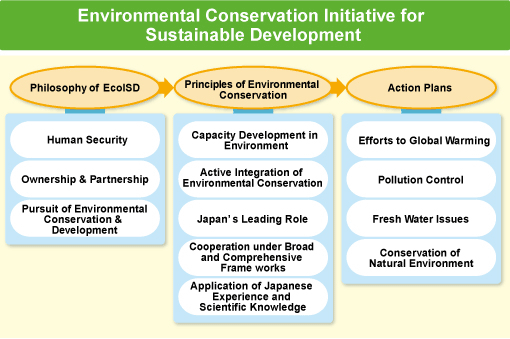In the Basic Environment Plan (2012), Japan provided the plan and the direction for international efforts including support for developing countries, as well as the individual efforts and approaches listed below.
Basic Strategy of the Promotion of Environmental Infrastructure (2017)
In July 2017, the Ministry of the Environment, Japan developed the Basic Strategy of the Promotion of Environmental Infrastructure to contribute to the reduction of pollution damage and waste issues in developing countries that have been increasing according to economic development and urbanization, by transferring Japanese environmental technologies, knowledge and systems through public-private partnership. The strategy includes three major activities and also sets sector and regional strategies respectively. MOEJ will promote the expansion of quality infrastructure under the Strategy, aiming for "leapfrog" development that minimizes the total cost of pollution measures.
- Top-level sales utilizing opportunities such as bilateral policy dialogue and inter-regional forums
- Promotion of support as a package from system to technology and fi nance, and dissemination of economic and social impacts
- Strengthening of implementation structure by cooperating with private enterprises, municipalities, other ministries and agencies, as well as domestic and overseas donor organizations
Hatoyama Initiative (2009)
On 22 September 2009, at the United Nations Summit on Climate Change in New York, Yukio Hatoyama, former Prime Minister of Japan, proposed a "Hatoyama Initiative".This initiative deems the following four principles essential in assisting developing countries:
- the developed countries, including Japan, must contribute through substantial, new and additional public and private financing
- we must develop rules that will facilitate international recognition of developing countries' emissions reductions, in particular those achieved through financial assistance, in a measurable, reportable and verifiable manner.
- on assistance to developing countries, consideration should be given to innovative mechanisms to be implemented in a predictable manner.And an international system should be established under the auspices of the UN climate change regime.This system should facilitate one-stop provision of information on and matching of available bilateral and multilateral financing, while securing transparency and effective utilization of assistance.
- Japan proposes to establish a framework to promote the transfer of low-carbon technologies which ensures the protection of intellectual property rights.
On 16th December, at the COP15 in Copenhagen, the Government of Japan announced its scaled up support for developing countries under the "Hatoyama Initiative".As for assistance up to 2012, Japan will provide financial assistance to developing countries of approximately 1 trillion 750 billion Yen, including public and private finance, on the condition that successful political accord is achieved at COP 15, that is a fair and effective framework with participation of all major emitting countries and agreement of their ambitious targets.
Clean Asia Initiative (2008)
It presents the efforts by Ministry of the Environment.Details are available in the Clean Asia Initiative (CAI).
The Direction of International Environmental Cooperation (2005)
In November 2004, the Minister of the Environment requested the Central Environment Council to consider the shape of future international environmental cooperation corresponding to changes in and outside the country concerning environmental conservation in recent years.The Council established an International Environmental Cooperation Technical Committee under the Council's Global Environment Committee.
From December 2004, the Technical Committee thoroughly discussed Japan's strategy for moving international environmental cooperation forward.
In June 2005, the Technical Committee made a draft report to the Global Environmental Committee.And in July of the same year, after the Committee's discussion on the draft, this final report was submitted to the Minister of the Environment by the Central Environment Council.
Environmental Conservation Initiative for Sustainable Development (EcoISD)
Japan will continue actively to extend environmental cooperation, mainly through its ODA, in order to support sustainable development in the world.In 2002, for this purpose, Japan issued its Environmental Conservation Initiative for Sustainable Development (EcoISD), replacing the ISD (1997), so as to carry out more effective and efficient environmental cooperation.
Based on the principle of Capacity Development in Environment and Application of Japanese Experience and Scientific Knowledge, etc., Japan will promote action plans in four areas of priority: Efforts to Address Global Warming, Pollution Control, Fresh Water Issues and Conservation of Natural Environment.



